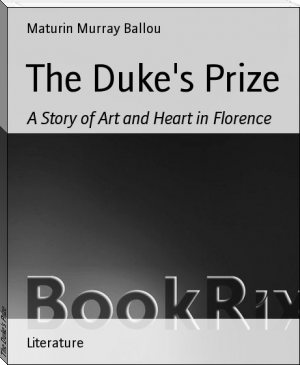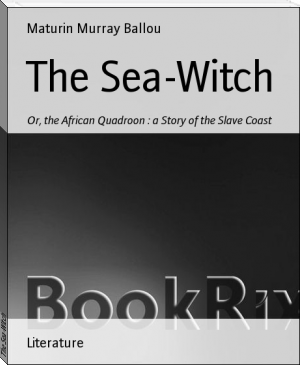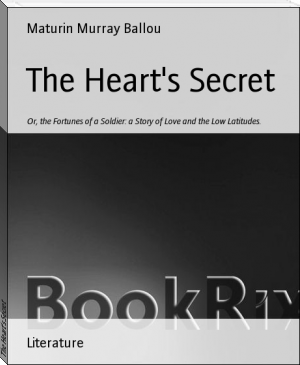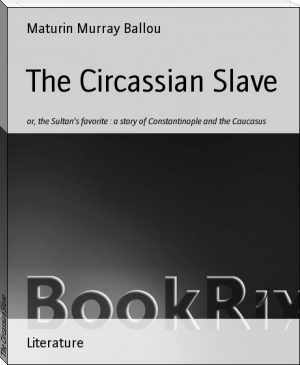The Duke's Prize by Maturin Murray Ballou (popular books of all time TXT) 📕

- Author: Maturin Murray Ballou
Book online «The Duke's Prize by Maturin Murray Ballou (popular books of all time TXT) 📕». Author Maturin Murray Ballou
of blood and bone, and though the sand of the plain was hot and arid, and unfavorable in every respect for speed, yet his mettled horse bore him gallantly forward, and brought him nearer every instant to the foe. On he flies-at every stride he gains-spurs and harness jingle like the iron upon the smith's forge. The sand rolls up in huge folds behind his horse's heels-the polished steel flashes back the sunlight, as it penetrates the clouds of dust. Nearer and nearer he approaches,--madly plunged the horses of the Moslems as they strove vainly to reach the haven of safety-the walls of the holy city. It is useless. The knight has divined the object of their precipitate flight, as a stifled female shriek is borne to his ears, and nothing can exceed the impetuosity of his pursuit.
"'Turn, cowards! Deliver up to me the maiden!'
"On he thundered;-with a clang his sword leaped from the scabbard, and in an instant came crashing through a Moslem turban, and a Moslem skull-splitting them both in twain. Then the Moors turned. Sword strokes fell thick and fast, and nothing was heard but the clinking of iron, and nothing seen but the flashing of scimitars. Straight into the middle of the troop penetrated the knight, where supported fainting upon a rearing steed, was a beautiful Moslem lady.
"'Zelica, have courage! I come to save you!'
"The infidels tumbled from their horses, as the blows of the knight's good sword fell among them, and several sought safety in flight. Those who remained continued the combat desperately around the sinking maiden, as if determined to sell their captive's deliverance only with their lives. But four were left, and against these, who had drawn up in line, the knight was about to hurl himself, when a Templar, in armor glittering with jewels and gold, came scouring across a the plain, and mingled in the fight. But instead of of helping the hotly pressed knight, he cleft his morion by a dastard stroke from behind, and but for the thickly plated steel, would have thus ended his life upon the spot. The good knight was hurled dizzy from his steed upon the trodden field, and the Templar spurred against the Moors. His charger was fresh, and his blood was up, so he had but little difficulty in slaying the Infidels, and reaching the beautiful captive. Seizing her in his powerful arms, he was about to leave the spot, when 'Conrad,' burst from the maiden's lips, and the knight who had been prostrated by the felon blow, rose from the dust upon his knees, and hurled his gauntlet into the Templar's very face.
"'Stop!' he thundered. 'Release the lady, or fear the vengeance of Heaven!'
"The Templar's visor was up, and as the glove struck him, his face grew black with rage.
"'Conrad D'Amboise!' he shouted, 'your attempts to thwart my purposes are vain. Thus do I take vengeance upon you!' And plunging his spurs into his horse's sides, he would have rode him down. Yes," continued the palmer; his eyes sparkling with fire, and his whole frame quivering with the most intense excitement, "he would have trampled his bones in the dust beneath his horse's hoofs, had not the sable knight burst upon him like a thunderbolt, and checked him in mid career. The dastardly Templar turned to fly, but the sword of the black warrior flashed from its sheath, and with a single vault that dark charger stood directly before him.
"'Stand, and disgrace no longer chivalry!'
"The Templar closed his visor, and drew his blade. Sparks of fire were struck from the clashing metal, and tufts of crests were borne by the wind towards the walls of Jerusalem, as plumes were mutilated by the ringing weapons. I saw that Knight Templar thrice borne to the ground, by the powerful arm in the sable mail, and thrice arise again, like a phenix from its ashes, to renew the deadly struggle. As he recovered his seat the third time, almost spent by his exertions, he threatened to plunge his sword into the heart of his senseless burden, unless the black knight desisted from the combat, and declared his motive for assailing him.
"'To wipe out the foul stain with which thou hast this day sullied the fair escutcheon of chivalry, in riding down a helpless Christian knight, and ravishing a defenceless maiden from the hands that alone have a right to protect her! I will give thee thy life on one condition, craven! Surrender up to me the maiden, and thou art free to depart! But enter not a foot again into the Christian camp. An army renowned as being the mirror of French chivalry cannot honorably harbor a miscreant like thee!'
"The form of the Templar quivered with rage. But his armor was split from helm to gorget--his horse bleeding and staggering with pain and terror, and certain destruction could be his only fate, if he continued the combat.
"'I yield to thy conditions, but when we meet again in fair field, I shall dictate the terms of surrender!'
"The black champion lifted, as if she had been an infant, the charming Zelica from the Templar's saddle-bow, and bore her senseless form to the unhorsed knight. The Templar rode slowly and sullenly away in the direction of the hills of Palestine, and I have never seen him since. It is reported that he has returned to France, and having renounced the oaths of his order, travels in the guise of a simple knight, doing deeds that dishonor chivalry, and render him universally odious. The dark mailed warrior has remained in Palestine for a long period, doing mighty deeds of valor, and sustaining the cause of Christ with his powerful arm; but he left the Holy Land about the time of my departure, and is now on his way home, to share the laurels bestowed upon the valiant defenders of the faith."
The palmer ceased. All eyes were still bent upon him, and all looked sorry that his tale had closed so soon.
"When did you leave the knight of the black armor?" asked the beautiful Joan, crimsoning to the temples as she put the simple question.
"It was above six months since, when I saw him at Constantinople. He was on the eve of departure for France with his retinue."
The fair girl blushed still more brightly, and reclining within the cushions of her splendid chair, remained silent and thoughtful during the remainder of the evening.
CHAPTER II.
While the pilgrim was engaged in his recital, one of the guests at the head of the festal board had listened with peculiar eagerness. He was a knight, tall and finely limbed, and attired with pointed elegance and taste. His pourpoint was barred with gold, and deep fringes of the same precious metal adorned its borders. His face was swarthy from exposure, though classical in contour, and eminently handsome in expression. His lips curled proudly, his nostrils were thin, and in every feature might be traced the unmistakable tokens of pride and sensuality. His seat was by the side of Joan, and he was assiduous in his efforts to please her-performing for her all those knightly devoirs which the gallant age of chivalry required.
The eye of the palmer had more than once, during his narration, been fastened upon this handsome knight, with incomprehensible significance, and particularly as he spoke of the attempt of the Templar to ride over the prostrate champion of Zelica, did his large orbs cast upon the richly attired guest a look of mingled scorn and anger, which, had it been observed by the host or the other guests, would have tasked the skill of the greatest Odipus among them to divine.
"Pass round the flagon! Let the wassail begin!" shouted the jovial Percy Du Bois.
Joan retired to her chamber with her maids, and the revel began. The board groaned with the good cheer, and as the wine flowed more freely, the constant potations of the generous liquor began to have its effect upon the hilarity of the guests. They began to display unusual license, in their songs and conversation. Broad jests went round, and the hall commenced resounding with the shouts of an incipient revel. Seizing a flagon of foaming Burgundy, the knight of the gold embroidered pourpoint quaffed it to the lovely Joan Du Bois. The health was received with a general uproar of approval, and wassail was drunk to many other fair dames, by the rest of the revellers.
"'Destruction and death to the cowardly Templar, who battles against defenceless maids and unhorsed knights!"
As the palmer uttered this, he turned to see if all were emptying their flagons. Every one except the proud knight had quaffed his goblet to the dregs with peculiar satisfaction, and a yell of approbation. His stood untasted upon the board, and his eyes glared fiercely upon the palmer as their gazes met.
"Knew you personally this Knight Templar of whom you speak?" he asked.
"I did," replied the pilgrim, "and I owe him a debt which Heaven will yet afford me the means of repaying!"
The scowl upon the other's brow became more savage and lowering. He moved his position, and placing himself by the palmer's side, uttered in a low tone in his ear:
"Conrad D'Amboise, I know you, in spite of your disguise! Beware how you interfere with me or mine!"
Without waiting for a reply, he strode haughtily from the hall.
The revel was long protracted. At length the effect of the frequent libations began to show itself, and one by one the wassailers dropped unconsciously upon their benches, or staggering left the apartment for their own chambers, until the palmer, who was Conrad D'Amboise in disguise, remained the sole sensible occupant of the banquet hall. He sat silent and thoughtful, by the reeking board, listening to the murmur of the wind, as it sighed among the boughs of the trees in the adjacent forest of Ardennes. His mind was dwelling upon the events of the evening-the fierce demeanor of the knight-his insolent defiance-and his marked penchant for the lovely and sole heiress of the honors of the house of Du Bois. The hall was silent, not a sound broke the solemn stillness. The lamps gave forth a flickering light, and the vapor of the spilled wine poured up from the steaming table, and diffused itself throughout the room. Suddenly the harsh creaking of iron was borne audibly to his cars. The disguised knight was on his feet in an instant. He listened, and the same rough, grating noise was heard again distinctly--apparently issuing from the corridor which led to the outer portal. Conrad divested himself of his palmer's gown, and drawing his sword, opened the door of the banqueting-hall, and stood in the corridor. Cautiously he proceeded, and silently, until on arriving within a few yards of the castle entrance, the cause of the grating sounds which he had heard was apparent to him.
The outer door stood thrown wide open, and the night wind was swinging it back and forth upon its rusty hinges, producing most mournful melody. Surprised at so unusual a circumstance, he approached the portal, and looked out into the courtyard. Before him upon the pavement were a dozen mailed warriors, mounted, armed to the teeth, and motionless as statues. The pale moon shone upon their polished helms and corselets, giving them a most spectre like and supernatural appearance. They stood directly before the arched barbacan, which formed the entrance to the court, and appeared waiting for the warder, to lower the drawbridge over the moat, for their exit. Without expressing any astonishment at the strange scene thus presented to him, Conrad D'Amboise
"'Turn, cowards! Deliver up to me the maiden!'
"On he thundered;-with a clang his sword leaped from the scabbard, and in an instant came crashing through a Moslem turban, and a Moslem skull-splitting them both in twain. Then the Moors turned. Sword strokes fell thick and fast, and nothing was heard but the clinking of iron, and nothing seen but the flashing of scimitars. Straight into the middle of the troop penetrated the knight, where supported fainting upon a rearing steed, was a beautiful Moslem lady.
"'Zelica, have courage! I come to save you!'
"The infidels tumbled from their horses, as the blows of the knight's good sword fell among them, and several sought safety in flight. Those who remained continued the combat desperately around the sinking maiden, as if determined to sell their captive's deliverance only with their lives. But four were left, and against these, who had drawn up in line, the knight was about to hurl himself, when a Templar, in armor glittering with jewels and gold, came scouring across a the plain, and mingled in the fight. But instead of of helping the hotly pressed knight, he cleft his morion by a dastard stroke from behind, and but for the thickly plated steel, would have thus ended his life upon the spot. The good knight was hurled dizzy from his steed upon the trodden field, and the Templar spurred against the Moors. His charger was fresh, and his blood was up, so he had but little difficulty in slaying the Infidels, and reaching the beautiful captive. Seizing her in his powerful arms, he was about to leave the spot, when 'Conrad,' burst from the maiden's lips, and the knight who had been prostrated by the felon blow, rose from the dust upon his knees, and hurled his gauntlet into the Templar's very face.
"'Stop!' he thundered. 'Release the lady, or fear the vengeance of Heaven!'
"The Templar's visor was up, and as the glove struck him, his face grew black with rage.
"'Conrad D'Amboise!' he shouted, 'your attempts to thwart my purposes are vain. Thus do I take vengeance upon you!' And plunging his spurs into his horse's sides, he would have rode him down. Yes," continued the palmer; his eyes sparkling with fire, and his whole frame quivering with the most intense excitement, "he would have trampled his bones in the dust beneath his horse's hoofs, had not the sable knight burst upon him like a thunderbolt, and checked him in mid career. The dastardly Templar turned to fly, but the sword of the black warrior flashed from its sheath, and with a single vault that dark charger stood directly before him.
"'Stand, and disgrace no longer chivalry!'
"The Templar closed his visor, and drew his blade. Sparks of fire were struck from the clashing metal, and tufts of crests were borne by the wind towards the walls of Jerusalem, as plumes were mutilated by the ringing weapons. I saw that Knight Templar thrice borne to the ground, by the powerful arm in the sable mail, and thrice arise again, like a phenix from its ashes, to renew the deadly struggle. As he recovered his seat the third time, almost spent by his exertions, he threatened to plunge his sword into the heart of his senseless burden, unless the black knight desisted from the combat, and declared his motive for assailing him.
"'To wipe out the foul stain with which thou hast this day sullied the fair escutcheon of chivalry, in riding down a helpless Christian knight, and ravishing a defenceless maiden from the hands that alone have a right to protect her! I will give thee thy life on one condition, craven! Surrender up to me the maiden, and thou art free to depart! But enter not a foot again into the Christian camp. An army renowned as being the mirror of French chivalry cannot honorably harbor a miscreant like thee!'
"The form of the Templar quivered with rage. But his armor was split from helm to gorget--his horse bleeding and staggering with pain and terror, and certain destruction could be his only fate, if he continued the combat.
"'I yield to thy conditions, but when we meet again in fair field, I shall dictate the terms of surrender!'
"The black champion lifted, as if she had been an infant, the charming Zelica from the Templar's saddle-bow, and bore her senseless form to the unhorsed knight. The Templar rode slowly and sullenly away in the direction of the hills of Palestine, and I have never seen him since. It is reported that he has returned to France, and having renounced the oaths of his order, travels in the guise of a simple knight, doing deeds that dishonor chivalry, and render him universally odious. The dark mailed warrior has remained in Palestine for a long period, doing mighty deeds of valor, and sustaining the cause of Christ with his powerful arm; but he left the Holy Land about the time of my departure, and is now on his way home, to share the laurels bestowed upon the valiant defenders of the faith."
The palmer ceased. All eyes were still bent upon him, and all looked sorry that his tale had closed so soon.
"When did you leave the knight of the black armor?" asked the beautiful Joan, crimsoning to the temples as she put the simple question.
"It was above six months since, when I saw him at Constantinople. He was on the eve of departure for France with his retinue."
The fair girl blushed still more brightly, and reclining within the cushions of her splendid chair, remained silent and thoughtful during the remainder of the evening.
CHAPTER II.
While the pilgrim was engaged in his recital, one of the guests at the head of the festal board had listened with peculiar eagerness. He was a knight, tall and finely limbed, and attired with pointed elegance and taste. His pourpoint was barred with gold, and deep fringes of the same precious metal adorned its borders. His face was swarthy from exposure, though classical in contour, and eminently handsome in expression. His lips curled proudly, his nostrils were thin, and in every feature might be traced the unmistakable tokens of pride and sensuality. His seat was by the side of Joan, and he was assiduous in his efforts to please her-performing for her all those knightly devoirs which the gallant age of chivalry required.
The eye of the palmer had more than once, during his narration, been fastened upon this handsome knight, with incomprehensible significance, and particularly as he spoke of the attempt of the Templar to ride over the prostrate champion of Zelica, did his large orbs cast upon the richly attired guest a look of mingled scorn and anger, which, had it been observed by the host or the other guests, would have tasked the skill of the greatest Odipus among them to divine.
"Pass round the flagon! Let the wassail begin!" shouted the jovial Percy Du Bois.
Joan retired to her chamber with her maids, and the revel began. The board groaned with the good cheer, and as the wine flowed more freely, the constant potations of the generous liquor began to have its effect upon the hilarity of the guests. They began to display unusual license, in their songs and conversation. Broad jests went round, and the hall commenced resounding with the shouts of an incipient revel. Seizing a flagon of foaming Burgundy, the knight of the gold embroidered pourpoint quaffed it to the lovely Joan Du Bois. The health was received with a general uproar of approval, and wassail was drunk to many other fair dames, by the rest of the revellers.
"'Destruction and death to the cowardly Templar, who battles against defenceless maids and unhorsed knights!"
As the palmer uttered this, he turned to see if all were emptying their flagons. Every one except the proud knight had quaffed his goblet to the dregs with peculiar satisfaction, and a yell of approbation. His stood untasted upon the board, and his eyes glared fiercely upon the palmer as their gazes met.
"Knew you personally this Knight Templar of whom you speak?" he asked.
"I did," replied the pilgrim, "and I owe him a debt which Heaven will yet afford me the means of repaying!"
The scowl upon the other's brow became more savage and lowering. He moved his position, and placing himself by the palmer's side, uttered in a low tone in his ear:
"Conrad D'Amboise, I know you, in spite of your disguise! Beware how you interfere with me or mine!"
Without waiting for a reply, he strode haughtily from the hall.
The revel was long protracted. At length the effect of the frequent libations began to show itself, and one by one the wassailers dropped unconsciously upon their benches, or staggering left the apartment for their own chambers, until the palmer, who was Conrad D'Amboise in disguise, remained the sole sensible occupant of the banquet hall. He sat silent and thoughtful, by the reeking board, listening to the murmur of the wind, as it sighed among the boughs of the trees in the adjacent forest of Ardennes. His mind was dwelling upon the events of the evening-the fierce demeanor of the knight-his insolent defiance-and his marked penchant for the lovely and sole heiress of the honors of the house of Du Bois. The hall was silent, not a sound broke the solemn stillness. The lamps gave forth a flickering light, and the vapor of the spilled wine poured up from the steaming table, and diffused itself throughout the room. Suddenly the harsh creaking of iron was borne audibly to his cars. The disguised knight was on his feet in an instant. He listened, and the same rough, grating noise was heard again distinctly--apparently issuing from the corridor which led to the outer portal. Conrad divested himself of his palmer's gown, and drawing his sword, opened the door of the banqueting-hall, and stood in the corridor. Cautiously he proceeded, and silently, until on arriving within a few yards of the castle entrance, the cause of the grating sounds which he had heard was apparent to him.
The outer door stood thrown wide open, and the night wind was swinging it back and forth upon its rusty hinges, producing most mournful melody. Surprised at so unusual a circumstance, he approached the portal, and looked out into the courtyard. Before him upon the pavement were a dozen mailed warriors, mounted, armed to the teeth, and motionless as statues. The pale moon shone upon their polished helms and corselets, giving them a most spectre like and supernatural appearance. They stood directly before the arched barbacan, which formed the entrance to the court, and appeared waiting for the warder, to lower the drawbridge over the moat, for their exit. Without expressing any astonishment at the strange scene thus presented to him, Conrad D'Amboise
Free e-book «The Duke's Prize by Maturin Murray Ballou (popular books of all time TXT) 📕» - read online now
Similar e-books:





Comments (0)